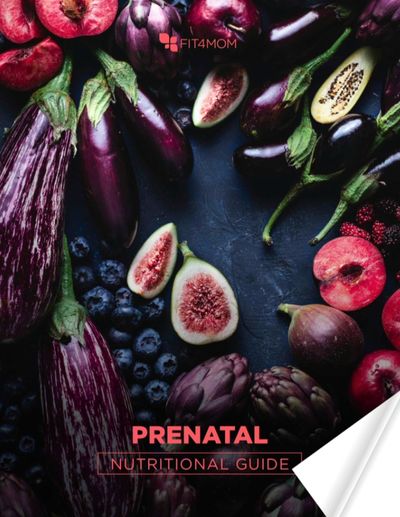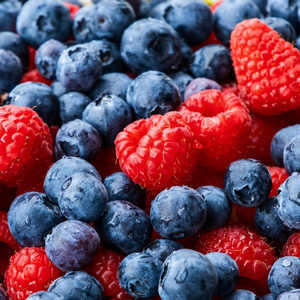When it comes to prenatal nutrition, there’s no shortage of advice—from friends, family, the internet, and countless “experts” on social media. Navigating these messages can be overwhelming and confusing, especially when well-intentioned advice turns out to be based on outdated science or misinformation. Let's break down some of the most common myths about prenatal nutrition and get to the facts so you can make informed choices that truly support your and your baby’s health.

Debunking Myths of Prenatal Nutrition
FIT4MOM x Jessica Maurer

Myth #1: You Need to “Eat for Two”
This is one of the most commonly heard myths about pregnancy! While it’s true that your body needs extra nutrients to support your growing baby, the idea that you need to double your calorie intake is a misconception. Caloric needs increase by about 300–500 calories per day in the second and third trimesters. In the first trimester, your body requires only a slight calorie increase.
The Reality: Focus on eating nutrient-dense foods rather than simply increasing calories. Emphasize quality over quantity with balanced meals that include proteins, healthy fats, whole grains, and plenty of fruits and vegetables. Following these guidelines will help you maintain steady energy and ensure your baby receives essential nutrients for growth without unnecessary weight gain.
Myth #2: Morning Sickness Means Your Baby Wants a Specific Food
Morning sickness is one of pregnancy’s least pleasant symptoms, and many myths surround it. Some say that cravings or aversions are your baby’s way of "communicating" their needs to you, suggesting that if you're craving pickles or avoiding certain foods, your baby might need specific nutrients. While cravings and aversions are common, research shows that morning sickness is primarily linked to hormonal changes rather than nutritional needs.
The Reality: Morning sickness is primarily due to hormonal shifts in early pregnancy, with significantly rising levels of estrogen and hCG (human chorionic gonadotropin). Eat what you can tolerate and focus on small, frequent meals to help manage nausea. For those struggling to eat various foods, prenatal vitamins can help bridge nutritional gaps, ensuring you and your baby get essential nutrients.

Myth #3: Certain Foods Cause Birth Defects
Another prevalent myth suggests that certain foods can lead to birth defects, causing many women to restrict their diets more than necessary. While certain foods should be avoided during pregnancy, like unpasteurized dairy, raw fish, and high-mercury seafood, most foods pose little risk when properly prepared. Focusing on a balanced diet rather than fearing certain foods can positively affect your prenatal experience.
The Reality: Birth defects are typically linked to genetic factors or specific risk factors such as nutrient deficiencies, infections, or environmental factors. To support healthy fetal development, ensure you consume adequate amounts of essential nutrients, including folate, iron, and calcium (link to the chia pudding recipe blog), while avoiding unsafe food practices like undercooked meat or raw eggs. Consulting your healthcare provider about foods to avoid and safe preparation methods can also provide peace of mind.
Myth #4: Caffeinated Beverages Are Entirely Off-Limits
For many, giving up coffee and tea is the hardest part of a prenatal diet. Fortunately, while it’s true that caffeine crosses the placenta and can affect the baby’s heart rate, research shows that moderate caffeine intake is generally safe during pregnancy. The American College of Obstetricians and Gynecologists (ACOG) suggests limiting caffeine intake to 200 milligrams daily (about one 12-ounce cup of coffee).
The Reality: You don’t necessarily have to forgo your morning coffee. To stay within the recommended limits, keep track of your caffeine intake from all sources, including tea, chocolate, and some medications. If you’re looking to reduce caffeine, try options like herbal teas or decaf coffee, which allow you to enjoy a warm beverage with minimal caffeine intake.

Myth #5: Restrictive Diets Are Safe During Pregnancy
In recent years, restrictive diets, like keto or low-carb, have gained popularity for their weight-loss benefits, leading some women to consider them during pregnancy. However, restrictive diets are not recommended for pregnant women, as they can deprive your body—and your baby—of essential nutrients. Pregnant women need a balanced intake of macronutrients (carbs, proteins, fats) and micronutrients (vitamins and minerals) to support their health and their baby’s growth.
The Reality: Pregnancy isn’t the time to follow a restrictive diet. A balanced, varied diet with an emphasis on whole foods is key. Carbohydrates are essential for energy, proteins are crucial for fetal growth, and healthy fats support brain and nervous system development. Instead of limiting entire food groups, focus on quality sources of each nutrient type and consult a healthcare professional for personalized dietary guidance.

Empowering Yourself with Reliable Information
Many myths around prenatal nutrition make it challenging to know what’s best for you and your baby. Instead of following popular advice or trends, focus on eating balanced meals that provide a variety of nutrients. If you are looking for more evidence-based insights? FIT4MOM’s Prenatal Nutritional Guide covers trimester-specific tips and dispels common myths so you can feel empowered to make the best choices for your pregnancy.
The guide also busts common pregnancy nutrition myths, offers hydration tips, and highlights superfoods to keep you energized and thriving. With expert advice on what to eat and why, this guide helps you make informed choices for a healthy, happy pregnancy.
What You’ll Get:
Trimester-by-Trimester Nutrition Breakdown: Discover the key nutrients your body needs for each stage of pregnancy. We've got you covered from folate-rich foods in the first trimester to energy-boosting meals for the third.
Delicious, Easy Recipes: Enjoy tasty, healthy meals and snacks with simple recipes like Kale Chips, Avocado Broccoli Salad, and Date Bliss Balls. Each recipe contains the necessary nutrients to fuel your body and nurture your baby.
Myth-Busting Insights: Separate facts from fiction when it comes to pregnancy nutrition. Learn the truth about “eating for two,” caffeine consumption, and more.
Hydration and Healthy Snack Ideas: Stay energized and hydrated with practical tips and tasty suggestions for every craving.
Nutritional Superfoods: Power up your meals with foods that support your pregnancy, such as kale, berries, lentils, and quinoa.
Need more?
Check out these resources as well!





